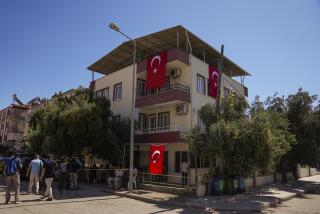Nation’s Record on Torture Cases Still Cause for Alarm
- Share via
MURADIYE, Turkey — About two weeks ago, police stopped Cetin Paydar on his way to work at a coffeehouse in this village in western Turkey. They had a complaint from a relative that the 40-year-old waiter had killed his own father.
A short, thin man with listless eyes, Paydar shook as he recalled what happened next:
“The police hit me nonstop during the ride to the station. They kept demanding that I confess,” he said. “I kept telling them I had done nothing of the kind and that I had no idea where [my father] was. But they just kept hitting me.”
At the station, he was forced to strip to his underwear and kneel for more beatings, he said.
“By the time they brought out the electric rods and pointed them at my genital area, I was so terrified I said that I had shoved my father into the river and run away,” he said.
However, the police had not bothered to verify the father’s death. Three days later, the alleged murder victim was seen strolling through a local park. Paydar was told to go home and keep quiet if he did not want to risk further abuse.
His story is not unusual in Turkey, where torture in detention remains systematic and widespread, according to Turkey’s Human Rights Foundation.
“Most of the cases go unrecorded because people are too afraid to approach us,” said the watchdog group’s leader, Yavuz Onen.
Police abuses such as torture, “mystery” killings and disappearances are often cited by European officials as one reason they continue to rebuff Turkey’s decade-old application for European Union membership.
Eager to join the European group, Prime Minister Mesut Yilmaz pledged upon taking office nine months ago that he would clean up the abuses.
That effort was set back by the acquittal Wednesday of 10 police officers accused of torturing 16 high school students.
“For sure, the debate on human rights among Turkish officials is more open than it’s ever been before,” a senior European diplomat said. “But, as we’ve seen this past week, this has not translated into any concrete action.”
The police officers on trial had arrested the students two years ago in the nearby town of Manisa for putting up left-wing political posters and spraying graffiti on a wall.
Five of the students are serving 12-year sentences for membership in a terrorist group. None were proven to have committed any violent act.
Defense lawyers produced medical reports showing that the students had been tortured while in custody. The reports established that two of the female detainees had been sexually assaulted.
John Shattuck, assistant U.S. secretary of State for human rights, said during a recent visit that the trial of the officers was a test case of Turkey’s commitment to human rights.
*
Metin Bakallci, who runs four Human Rights Foundation centers that treat torture victims, said reports of torture have declined in recent months because the police have developed methods that leave no traces--such as laying the victim on a block of ice before applying electric shocks.
Doctors who examine torture victims are often coerced into covering up evidence, he said.
Earlier this week a prosecutor in Aydin province demanded a three-year sentence for a doctor, Eda Guven, after she reported that six detainees at a police station had been tortured.
The doctor was cleared of charges of professional abuse Tuesday amid a public campaign on her behalf.
More to Read
Sign up for Essential California
The most important California stories and recommendations in your inbox every morning.
You may occasionally receive promotional content from the Los Angeles Times.













